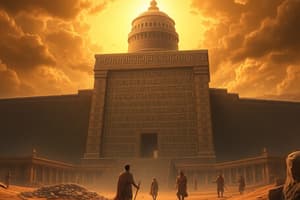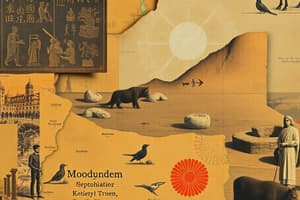Podcast
Questions and Answers
What was a significant achievement of the Sumerians?
What was a significant achievement of the Sumerians?
- Development of the wheel
- Establishment of a democratic system
- Invention of pottery
- Creation of cuneiform writing (correct)
Who established the first empire in the Fertile Crescent?
Who established the first empire in the Fertile Crescent?
- Gilgamesh
- Nebuchadnezzar
- Hammurabi
- Sargon of Akkad (correct)
What famous legal contribution is attributed to the Babylonians?
What famous legal contribution is attributed to the Babylonians?
- Code of Justinian
- The Twelve Tables
- Hammurabi's Code (correct)
- Magna Carta
Which civilization is known for its military prowess and extensive library at Nineveh?
Which civilization is known for its military prowess and extensive library at Nineveh?
What was the primary geographical feature aiding agriculture in the Fertile Crescent?
What was the primary geographical feature aiding agriculture in the Fertile Crescent?
Which civilization is famous for the Hanging Gardens and advancements in astronomy?
Which civilization is famous for the Hanging Gardens and advancements in astronomy?
How did the Fertile Crescent influence cultural exchanges among civilizations?
How did the Fertile Crescent influence cultural exchanges among civilizations?
What was a key factor in shaping settlement patterns in the Fertile Crescent?
What was a key factor in shaping settlement patterns in the Fertile Crescent?
Which major trade route connected the Fertile Crescent to Asia?
Which major trade route connected the Fertile Crescent to Asia?
What significant influence did the Fertile Crescent have on later religions?
What significant influence did the Fertile Crescent have on later religions?
Flashcards are hidden until you start studying
Study Notes
History of the Fertile Crescent
Ancient Civilizations
-
Sumerians (c. 4500-1900 BCE):
- First major civilization in Mesopotamia.
- Known for cuneiform writing, ziggurats, and advancements in mathematics and astronomy.
-
Akkadians (c. 2334-2154 BCE):
- Established the first empire under Sargon of Akkad.
- Spread the use of the Akkadian language.
-
Babylonians (c. 1894-539 BCE):
- Hammurabi's Code (c. 1754 BCE): Earliest written legal code.
- Notable for contributions to law, literature, and mathematics.
-
Assyrians (c. 2500-609 BCE):
- Known for military prowess and extensive library at Nineveh.
- Advanced in architecture and governance.
-
Chaldeans (Neo-Babylonians, c. 626-539 BCE):
- Famous for the Hanging Gardens and advancements in astronomy.
-
Phoenicians (c. 1500-300 BCE):
- Maritime traders and the spreaders of the alphabet.
- Established city-states like Tyre and Sidon.
Historical Geography
-
Location:
- Region between the Tigris and Euphrates rivers.
- Encompasses modern-day Iraq, Syria, Lebanon, Israel, and parts of Turkey and Iran.
-
Topography:
- Fertile land due to river silt, facilitating agriculture.
- Natural barriers (mountains, deserts) influencing settlement patterns.
-
Climate:
- Semi-arid to arid with seasonal rainfall, allowing for early agricultural practices.
Cultural Exchanges
-
Trade and Interaction:
- Crossroads of major civilizations leading to cultural diffusion.
- Spread of ideas, technologies, and religions across regions (e.g., from Mesopotamia to Egypt).
-
Religious Practices:
- Shared mythologies and deities among neighboring cultures.
- Significant influence on later Abrahamic religions (Judaism, Christianity, Islam).
-
Technological Innovations:
- Transfer of agricultural techniques, metallurgy, and writing systems across cultures.
Trade Routes
-
Silk Road:
- Connected the Fertile Crescent to Asia, facilitating trade of silk, spices, and goods.
-
Incense Route:
- Linked Arabian Peninsula to the Mediterranean, trading incense and exotic goods.
-
Maritime Trade:
- Phoenicians established trade networks across the Mediterranean Sea.
-
Overland Trade:
- Caravans transported goods across desert routes, connecting various civilizations and enhancing economic exchange.
-
Impact of Trade:
- Promoted wealth and the rise of city-states.
- Enabled cultural and technological exchanges that shaped future civilizations.
Ancient Civilizations
- Sumerians (c. 4500-1900 BCE):
- Pioneered civilization in Mesopotamia, credited with developing cuneiform writing, ziggurats, and significant mathematical and astronomical knowledge.
- Akkadians (c. 2334-2154 BCE):
- Founded the first empire under Sargon of Akkad, widely disseminating the Akkadian language across regions.
- Babylonians (c. 1894-539 BCE):
- Authored Hammurabi's Code, one of the world's earliest legal systems, and enriched law, literature, and mathematics.
- Assyrians (c. 2500-609 BCE):
- Renowned for military strength and notable for the extensive library at Nineveh, excelling in architecture and governance.
- Chaldeans (Neo-Babylonians, c. 626-539 BCE):
- Celebrated for the Hanging Gardens and notable advancements in astronomy.
- Phoenicians (c. 1500-300 BCE):
- Key maritime traders, widely credited for spreading the alphabet and establishing influential city-states like Tyre and Sidon.
Historical Geography
- Location:
- Situated between the Tigris and Euphrates rivers, covering present-day Iraq, Syria, Lebanon, Israel, and parts of Turkey and Iran.
- Topography:
- Fertile soil from river silt facilitated agriculture; natural features like mountains and deserts shaped settlement patterns.
- Climate:
- Predominantly semi-arid to arid, with seasonal rains enabling the development of early agricultural practices in the region.
Cultural Exchanges
- Trade and Interaction:
- Served as a cultural crossroads, fostering the diffusion of ideas, technologies, and religions, such as influences from Mesopotamia to Egypt.
- Religious Practices:
- Shared mythologies and deities among neighboring civilizations, significantly impacting later Abrahamic religions (Judaism, Christianity, Islam).
- Technological Innovations:
- Enhanced transfer of agricultural techniques, metallurgy advancements, and writing systems among various cultures.
Trade Routes
- Silk Road:
- Linked the Fertile Crescent to Asia, facilitating the trade of silk, spices, and other goods.
- Incense Route:
- Connected the Arabian Peninsula with the Mediterranean, specializing in the trade of incense and exotic items.
- Maritime Trade:
- Phoenician traders established extensive networks across the Mediterranean Sea, enhancing trade efficiency.
- Overland Trade:
- Caravans moved goods across desert routes, cultivating economic exchange and connections among diverse civilizations.
- Impact of Trade:
- Fostered wealth accumulation and the rise of city-states, promoting significant cultural and technological exchanges that shaped future societies.
Studying That Suits You
Use AI to generate personalized quizzes and flashcards to suit your learning preferences.




